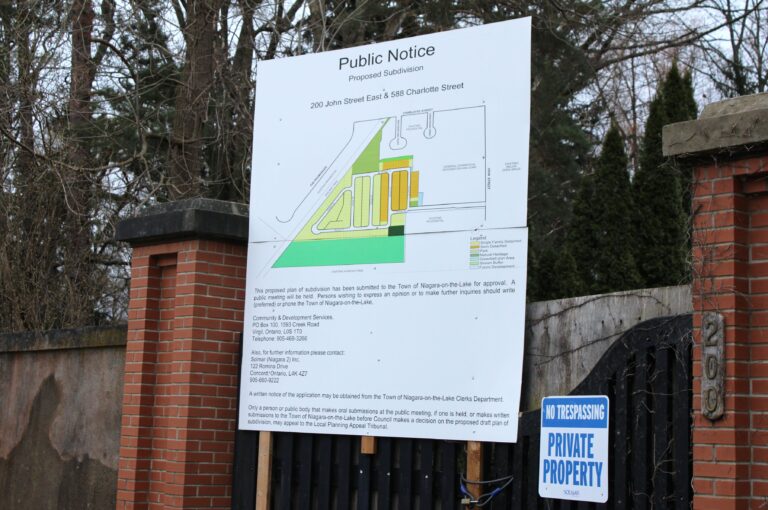Council finally agrees on response, but administrators sent their own letter to province in November
After discussions at three separate meetings – and two months after senior staff expressed their concerns to the province – Niagara-on-the-Lake council has agreed to send a letter to the Doug Ford government about its controversial new housing law.
The vote Tuesday was not unanimous.
Couns. Wendy Cheropita, Adriana Vizzari and Erwin Wiens all voted against it.
After seeing revisions to the letter originally drafted by Coun. Sandra O’Connor, Wiens was not satisfied.
He was concerned the move was still too aggressive and that the town has not had luck with this type of approach in the past.
“Our job is not to be political in the sense of political lines,” Wiens said. It is “to work with the government of the day.”
Lord Mayor Gary Zalepa spoke in favour of the letter but wanted to clarify that “This municipality and the council have responded already” to Bill 23.
He was referring to the staff response to the bill which was sent as a letter to the province on Nov. 23.
Signed by chief administrator Marnie Cluckie, planning chief Kirsten McCauley and treasurer Kyle Freeborn, the letter says the town could lose $925,000 to $1.3 million over the next five years because Bill 23 has waived development fees associated with housing projects.
“The funds would either need to be funded through the existing tax base or supplemented by the province to make up the difference in funding,” the letter says.
The projected financial losses are one of several concerns outlined in the Nov. 23 letter to Housing Minister Steve Clark.
Councillors have twice debated the idea of responding to the provincial changes, but so far have deferred action.
Coun. Sandra O’Connor has urged council to vocally oppose the legislation and urge the government to delay implementing it until it has “meaningful consultation with the municipalities.”
But Coun. Gary Burroughs suggested her approach was “a bit aggressive” and Lord Mayor Gary Zalepa worried it was “a strategic blunder.”
The omnibus legislation, which received royal assent on Nov. 28, reworks many existing Ontario statutes.
Among them, it contains amendments that allow for gentle densification in established communities.
It permits construction of additional or accessory residential units “as of right” – meaning property owner can simply do it without obtaining permission from the town.
That effectively overrides municipal zoning bylaws.
“The town’s housing stock is often acquired for investment in short-term rental” and the bill could aggravate the issue, the staff letter says.
The three senior officials say the legislation might not help the province meet its goal of “providing more housing for new residents.”
The letter also questions the decision to pass urban planning responsibilities from the region to the town as well.
Known as the More Homes Built Faster Act, it reduces the role of the Niagara Peninsula Conservation Authority to regulate development in environmentally sensitive areas.
“The town does not have the expertise to perform this function in-house,” the letter says.
The town relies on planning experts at the regional level and environmental experts from the conservation authority for guidance on where to place new developments, including housing.
HERITAGE ACT CHANGES
Changes to the Ontario Heritage Act imposed by the new law will hamper Niagara-on-the-Lake’s ability to protect its historical buildings, the senior town officials say.
The town now has two years to assess 200 properties for heritage value or else they will be removed from the waiting list for five years.
The town keeps a list of properties with heritage value on its register, but only those that are “designated” are protected under the Ontario Heritage Act.
So long as non-designated buildings are on the list, property owners must provide 60 days’ notice before demolishing them.
The bill requires “the removal of non-designated property from the register” and “prevents a council from including such non-designated property in the register again for five years.”
Properties will no longer be allowed to sit on the waiting list indefinitely.
“Being a small municipality, the staff capacity to designate all buildings on the register is not feasible within a two-year timeframe,” says NOTL’s letter to the ministry.
A town spokesperson told The Lake Report in an email the town “typically completes one to three heritage designations per year.”
O’Connor plans to introduce a plan in the coming months to help prepare staff to get as many of these properties off the list as possible before they are automatically removed in two years.
LESS PARKLAND MANDATORY
New residential developments in Niagara-on-the-Lake could be a little less green in the future, the staff letter warns.
Changes under the new law could cut the amount of allocated park space by half in new neighbourhoods.
NOTL’s letter says the law will “impact the municipality’s ability to acquire parkland.”
The new statute alters the Planning Act by reducing the amount of parkland developers must provide in a project.
Future developments will only have to set aside one hectare (2.5 acres) of parkland for every 600 residential units instead of one hectare for every 300 units.
The staff letter argues parks are “essential to a community” because they ensure “space for recreation” and provide small benefits that are “essential for physical and mental health.”
Bill 23 also removes the town’s ability to regulate exterior design elements, except when they concern issues of public health and safety.
“The municipality would no longer be able to comment on the exterior design of the building or landscaping elements of the property,” says the letter.
This will make it harder for the town to prevent “undesirable results and development that does not contribute to a vibrant, attractive neighbourhood.”











